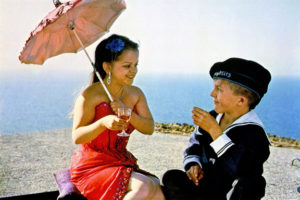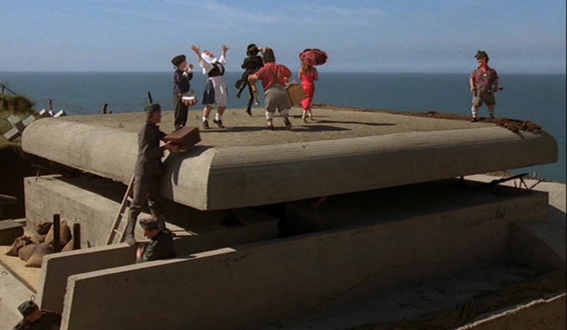Grass’s mordant picnic satire describes five dwarfs, all Nazis, all entertainers in Bebra’s “Theater at the Front,” gathering for a picnic feast on a beach in Normandy. The irony of pleasure is lost on them. Living in the present, Oskar and his friends are happy to have a day off to eat, dance, and sing, not knowing that the following day will be D-Day. Or, when Roswitha leaves her snug bed for a glass of water, she will be killed by an exploding bomb. Or that the Nazis will lose the war. Topsy-turvy picnics end like this.
Despite a general scarcity of provisions, their basket is generously packed with foods associated with the Allies, symbolizing the barbaric expectation that you are more potent when you eat your enemies: French pâté de foie gras, Soviet caviar, English corned beef, Danish butter cookies, Dutch eggs, South African ginger and plum preserves, French plum jam and honey, Danish boiled eggs, Hungarian salami, American cookies, raisin bread, and hot Dutch chocolate in a thermos bottle. They have all necessities: plates, flatware, eggs, cups, and napkins.

Oskar (David Bennet) and Roswitha (Mariella Oliveri) toast the happy outcome of the war. Volker Schlöndorff’s The Tin Drum (1979).
The picnic begins with delight:
Kitty: Oh, yes, a picnic in the open.
Felix: Nature has whetted our appetites.
Roswitha: Oh, sacred act of belly-filling that will unite the nations as long as men eat breakfast!
Bebra: Let us feast on the concrete. Let us have human rituals built on solid foundations!
The picnic turns nasty. A group of nuns from Lisieux looking for shellfish wander in a forbidden zone along the shore. Corporal Lankes, who is in charge of the pillbox, gets a call from his superior officer demanding that the beach be cleared. Following orders literally, Lankes machine-guns the nuns. Bothered by the noise, Roswitha cranks up the gramophone and plays the Pretenders, a rock and roll group famous for singing “The Great Pretender” (a joke because the song was not written until 1956). The massacre is over quickly, and as the souls of the murdered nuns fly to heaven, the troupe resumes its picnic. Oskar reprimands Roswitha for spreading the Danish butter too thick. But the picnic spell is broken, and they hastily depart. Later Bebra ruefully says, “We dwarfs and fools shouldn’t dance on concrete that’s been poured for giants.”
*For the sake of fiction, Grass makes it a perfect picnic day when in fact, June 5 was so densely overcast and so windy that the D-Day invasion was postponed until the next day, June 6,
See: Günter Grass. The Tin Drum [Die Blechtrommel]. Translated by Ralph Manheim. New York: Harcourt Brace Jovanovich, 1961; Volker Schlöndorff. The Tin Drum (1979), screenplay by Franz Seitz, Jr., Jean-Claude Carrière, Günter Grass, Volker Schlöndorff based on Gunter Grass’ The Tin Drum (1959); The Tin Drum: The Director’s Cut, http://www.janusfilms.com.s3-website-us-east-1.amazonaws.com/tindrum/tindrumpressnotes.pdf; https://www.springfieldspringfield.co.uk/movie_script.php?movie=blechtrommel-die-the-tin-drum
Featured Image: June 5, 1944, on a Nazi pillbox on Normandy Beach.

